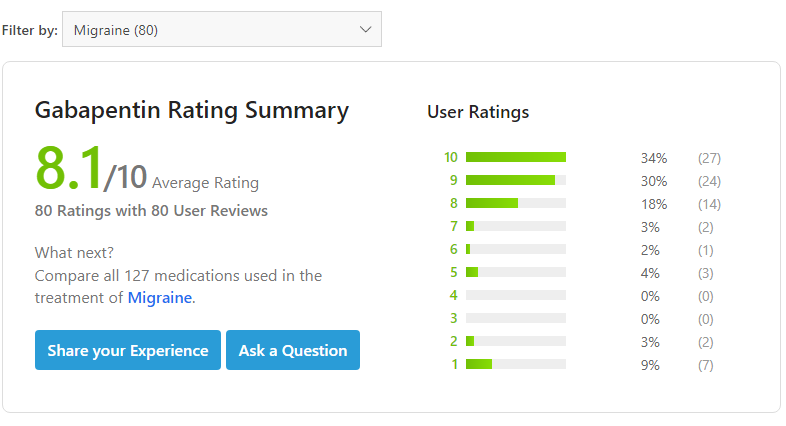Gabapentin is as an anti-epileptic drug and as an analgesic, particularly for pain of the neuropathic or neurogenic type. When used for controlling epilepsy, it is usually used in conjunction with another anti-epileptic drug. But Gabapentin is widely used to treat nerve pain or neuropathic pain than it is to treat epilepsy.
Gabapentin is also sometimes used to relieve the pain of diabetic neuropathy (numbness or tingling due to nerve damage in people who have diabetes), and to treat and prevent hot flashes (sudden strong feelings of heat and sweating) in women who are being treated for breast cancer or who have experienced menopause (”change of life”, the end of monthly menstrual periods). Talk to your doctor about the risks of using this medication for your condition.
It is also widely used to treat Anxiety and Migraine prevention.

One of Gabapentin “off-label” usage is for migraine prevention and treatment, including migraines with or without aura, vestibular migraines. It can reduce the frequency of headaches, pain intensity, and the use of symptomatic medications. Gabapentin is a good preventive therapy for migraines refractory to standard medications.
The chemical structure of gabapentin is related that of gamma-aminobutyric acid (GABA) which is a neurotransmitter in the brain. The exact mechanism as to how gabapentin controls epilepsy and relieves pain is unknown, but it probably acts like the neurotransmitter GABA.
The effective dose of gabapentin varies greatly. Some persons need only 200-300 mg a day whereas others may need 3000 mg or more a day. It may take several weeks to become effective, so it is important to stay on it for an adequate length of time.
The Efficacy of gabapentin in migraine prophylaxis experiment shows gabapentin is an effective prophylactic agent for patients with migraine.
In the Clinical trials, 143 patients evaluated gabapentin for migraine prophylaxis. After 3 months the patients taking gabapentin had a reduction of the migraine frequency by 1.5 migraines per month (or by 35.7%) compared with a reduction of 0.6 migraines per month for the placebo group. Also, gabapentin reduced the headache frequency by 50% or greater in 45% patients compared with only 16% patients on placebo. The most frequently reported adverse events were asthenia, dizziness, somnolence, and infection.
In Famous medical websites, migraine patients also review the gabapentin as the migraine prevention medicine. They rate Gabapentin 8.1 stars out of ten stars. It is a high mark and means Gabapentin is a very effective medicine for migraine prevention.
I haven’t been taking this medication for long but it’s helped so much. Neuro started me off on 300mg at night and now I’m at 600mg at night. It doesn’t make me sleepy or drowsy. Before starting gabapentin, I was having migraines just about every day. I started having aphasia and vision changes with my migraines, so I decided to take action. I’ve only been on it for almost 2 weeks but I’ve been migraine free and my triggers are no longer triggers at this point, which is fantastic. I should note it has reduced my appetite but this is not a negative thing.” – Crystaldreams July 25, 2017
This medication is..interesting. I am 20 with what a few doctors think is Fibro and a chronic pain condition but was Rx’d this med by a psych doctor for tension migraines. While it does NOT really help with migraines, it has been making me awfully sleepy and drowsy, and helping with weird aches and pains throughout my body. It can be used as a mood stabilizer and I can see why- because it makes you so drowsy you can’t do or say anything, especially after taking the evening dose! I’ve been afraid to drive any car since starting this. It makes me more drowsy than my anxiety meds which don’t make me drowsy at all! Doctor is raising the dose because since writing that first part- I have become quite used to the med, where my dose does NOT work – Chelseabergstresser (taken for 1 to 6 months) May 11, 2017
“I have chronic Migraine called Glutamate Storm. First dose of 100mgs made me sleep 36 hours. Before I got the prescription I never slept more than 5 hours per night and often only got 2 hours of sleep per night. But I did not want to take a prescription every day, so I only took it when my ears were ringing really loud and I was sleep deprived. But then I noticed that my chronic cough was always gone the day after taking Gabapentin. So I started taking it every day for that. When I did, my headache and ear ringing got a lot better. I am now taking 400 mgs per day. I had bad breath at first, but it’s gone. Dr. says it might have detoxed something. I am all for that. Better out than in. This drug has helped me a lot. And I am not pro-pharma.” – Gylm April 26, 2017